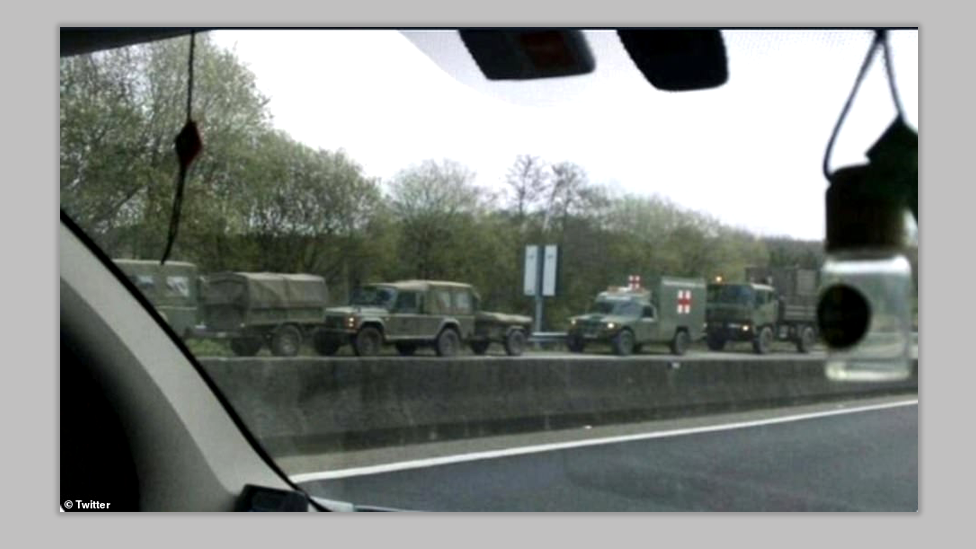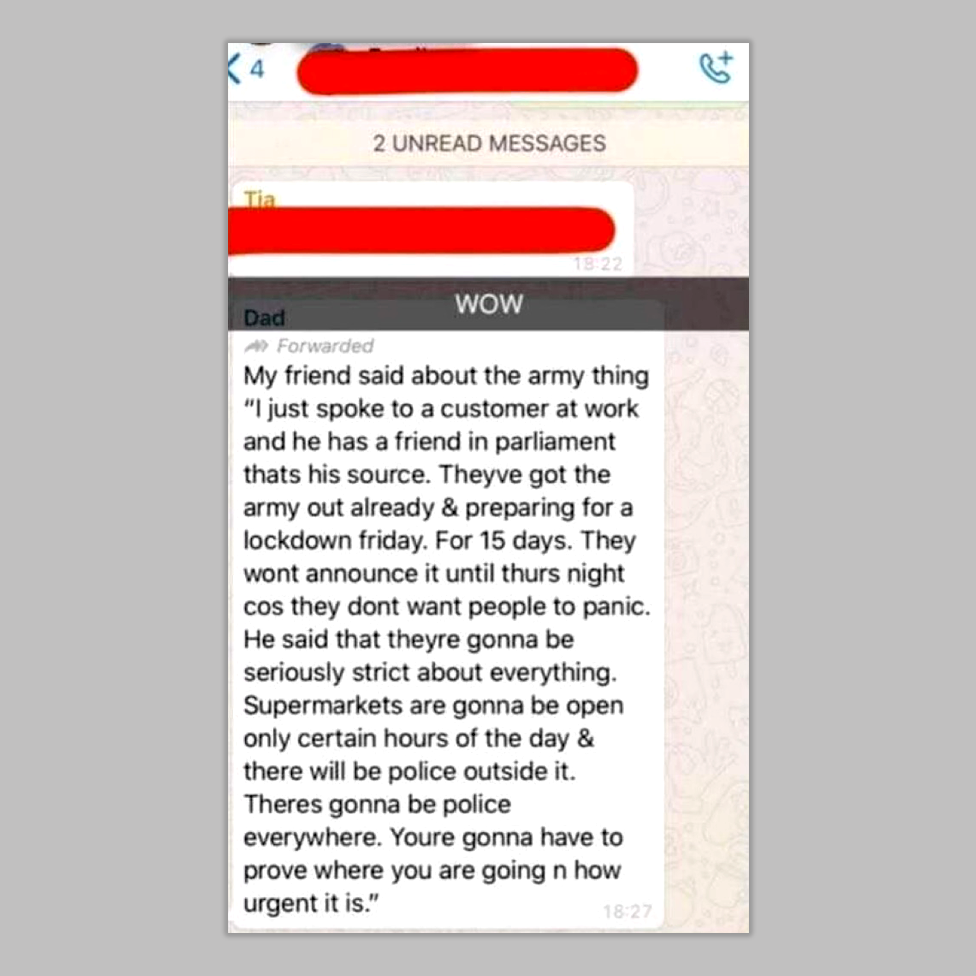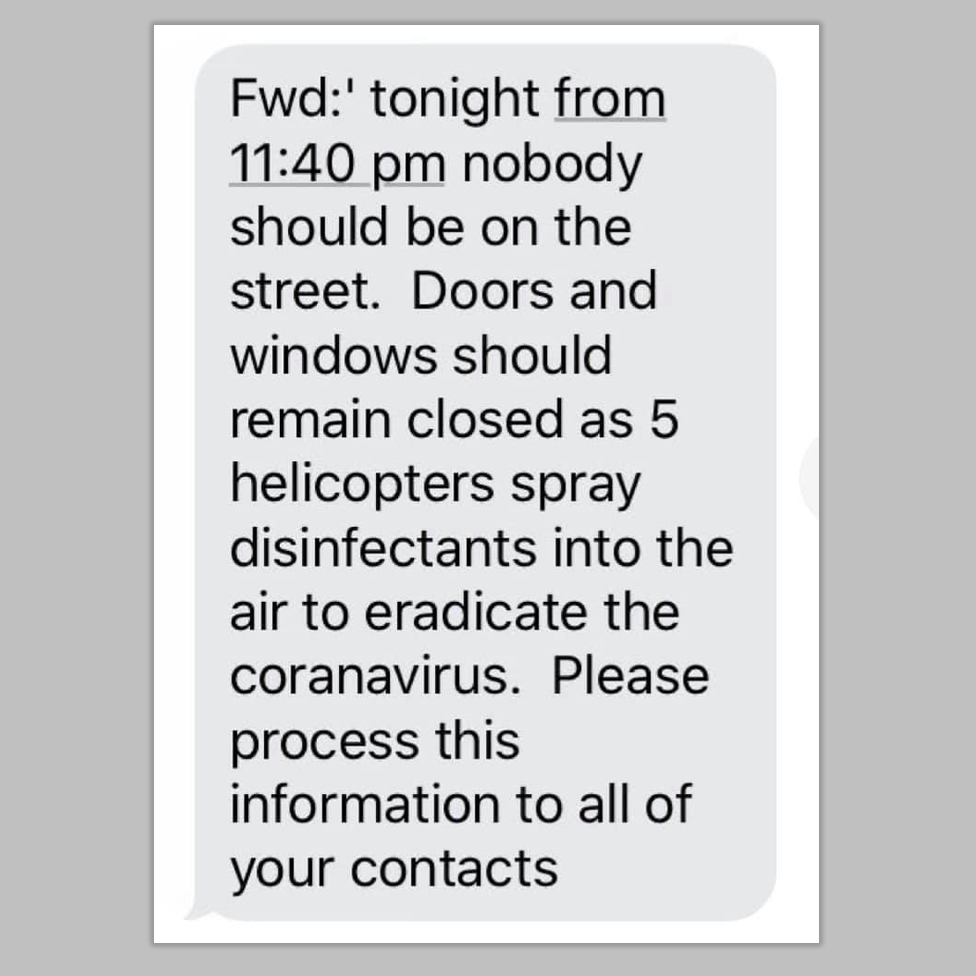Coronavirus: The viral rumours that were completely wrong
- Published

A picture of a supposed British military convoy - notice that the vehicles are driving on the right-hand side of the road
Remember those panicky viral messages you were forwarded on WhatsApp at the start of the pandemic?
They may have come as a text, voice note or blurry picture forwarded by a "friend of a friend" - and most of them were scarcely credible. Here's the truth behind a few of the most heart-stopping coronavirus rumours that we debunked at the time.
1. Tanks never arrived on the streets
What did the message say? In the middle of March, grainy pictures of military vehicles on highways began cropping up in WhatsApp chats and Facebook groups. They had captions like "On the M25!" and "Tanks expected in Newcastle tomorrow". They were shared with warnings about mass civil unrest that would, ostensibly, prompt a military crackdown.
How viral was it? The biggest platform for these rumours was WhatsApp. Because it's private and encrypted, it's impossible to know exactly how many people saw such messages - but we can conservatively estimate they were received by tens of thousands. Weeks later, people who run local Facebook groups told the BBC that they were still seeing mentions of alleged military plans for tanks on the streets.

WhatsApp messages spread other false claims about the army taking to the streets and police patrols outside supermarkets
How did we debunk it? This was initially difficult to tackle. We knew there were no tanks rolling along high streets. But we also knew the army might be deployed. And it's not uncommon to see military vehicles on public roads near army bases. However, some of the most popular photos circulating were clearly not showing scenes from the UK. The convoys were on the wrong side of the road, or the vehicles had foreign number plates.
We also used reverse image searches - that's where you plug a photo into a search engine to find other copies of it online. This revealed that many of the photos had been taken long before the pandemic. In the end, the British Army did deploy during the lockdown - but to provide logistical support to the NHS, not patrol the streets in armed vehicles amid scenes of mass unrest.
2. Bodies of coronavirus victims did not pile up in ice rinks
What did the message say? The news in the voice note was grim. Hundreds of healthy children would die every day. Ambulances wouldn't be dispatched even to severe Covid-19 cases. Bodies would be sent to "every ice-skating rink" as mortuaries filled up. The woman speaking claimed to work for the South East Coast Ambulance Service. The service was quick to dismiss the voice note as incorrect - however, it's never said whether or not the woman actually was an employee.
How viral was it? Viral enough to really scare people. Hundreds of people got in touch with BBC News asking about the voice note. Many were distressed by its contents. One woman told us the message had her daughter in a total frenzy - and that neither of them knew whether it was true. It spread so widely that Public Health England made a statement calling it "fake news".
How did we debunk it? There's a lot we still don't know about Covid-19, but even given the limited information available in the spring, the claims in the message were clearly preposterous. There were concerns that healthy, young people could also fall seriously ill with the virus - but the voice note suggested that a huge proportion of people dying from coronavirus would be children with no underlying conditions. Temporary mortuaries were planned, and one ice rink in Widnes, Cheshire, was briefly used to store a small number of bodies. But facilities were not overwhelmed, and the claims in the note were just not backed up by science.
3. Helicopters didn't spray disinfectant in the dead of night
What did the message say? It would happen in the middle of the night - a secret operation to deliver disinfectant from the air. The person behind the viral message which spread in March on Facebook and WhatsApp never explained how aerial bombardment would eliminate the virus where it spreads most of all - indoors. But still the warning came: stay inside, and close all doors and windows.

How viral was it? This one wasn't just shared in the UK. It spread on social media to hundreds of thousands of people in countries across the world: Colombia, Pakistan, Spain, the Netherlands and more. Yet the time of night and number of helicopters usually stayed the same.
How did we debunk it? This one was easy. Not only was the alleged plan rather useless, no formation of spraying helicopters emerged that night or any other night. In fact, this was the latest version of a persistent genre of conspiracy theories. For years, people have claimed that secret government programmes are delivering deadly chemicals from above.
4. A random doctor on a remote island did not suddenly unlock the secrets of Covid-19
What did the message say? Spain's Gran Canaria island was the somewhat unlikely starting point of a WhatsApp voice note that claimed to contain insider information. The woman speaking (in English) said she picked up the tips by talking to "a colleague who has a friend" working at a hospital. She gave a very specific story about how the disease progresses, and urged people to "take a sip of warm water every twenty minutes because this… washes any of the virus that's entered your mouth into your stomach where the gastric juices will neutralise it."
How viral was it? The voice note circulated around the world on apps like Whatsapp and Instagram. Dozens of readers and listeners sent it to us, asking if it was true.
How did we debunk it? This one required breaking down the specific claims and comparing them to what scientists knew at the time. For one thing, coronavirus symptoms and severity are highly variable, and there did not seem to be one exact progression pattern. That's become even clearer as the pandemic has progressed, as different people have been affected in vastly different ways. There's no scientific evidence that water kills the virus - and while it certainly won't hurt, there's no success story of someone curing or preventing coronavirus by sipping liquids.
5. There was never a giant lasagne in Wembley Stadium
What did the message say? One popular voice note that parodied other viral messages suggested the government was using Wembley Stadium as a gigantic oven. Billy McLean, a 29-year-old Londoner, laid on the sarcasm thicker than béchamel sauce as he joked about hearing of the lasagne plan from his "sister's boyfriend's brother" who "works for the Ministry of Defence". A few people may have been taken in. But more to the point, the prank was a sign of just how much the "friend of a friend with dodgy information" viral voice note had become a panicky part of pandemic culture.
How viral was it? This one went so viral that it sparked copycat voice notes making similar jokes - from garlic bread being baked in the Channel Tunnel to a salad being tossed in Rome's Coliseum.
How did we debunk it? Mostly by laughing along with everyone else.
Who starts viral misinformation... and who spreads it?
Follow Marianna on Twitter, external
Is there a story we should be investigating? Email us, external
Follow BBC Trending on Twitter @BBCtrending, external or on Facebook, external.